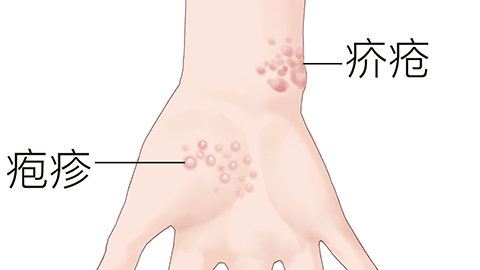What should I do if my face itches due to scabies?
In general, itching on the face caused by scabies may be due to incomplete facial cleansing, contact with contaminated objects, simple facial scabies infection, scabies complicated with facial seborrheic dermatitis, or cross-infection leading to facial folliculitis. It is recommended to seek timely medical attention, identify the cause, and improve the condition under a doctor's guidance through general treatments, medication, and other methods. The detailed analysis is as follows:

1. Incomplete facial cleansing: Accumulation of facial oils, dust, and secretions can easily adhere to scabies mites and provide a breeding environment, causing localized itching. Clean the face daily with warm water, choose mild and non-irritating facial cleansers, avoid excessive rubbing, and gently pat dry with a clean towel after washing.
2. Contact with contaminated objects: Using towels, pillowcases, cosmetics, or sharing washbasins with individuals who have scabies can transfer scabies mites to the face. Immediately replace personal facial towels and pillowcases, disinfect them by soaking in boiling water and sun-drying, and discontinue use of any suspected contaminated cosmetics.
3. Simple facial scabies infection: Scabies mites invade the stratum corneum of the facial skin, burrow tunnels, and release secretions that stimulate the skin, causing inflammation, light red papules, and significant itching. Patients should follow medical advice to apply topical medications such as sulfur ointment, crotamiton cream, or benzyl benzoate cream.
4. Scabies complicated with facial seborrheic dermatitis: Long-term irritation from scabies damages the facial skin barrier, triggering seborrheic dermatitis, which manifests as erythema, oily desquamation, and intensified itching. In addition to standard anti-scabies medication, patients may follow medical advice to apply topical treatments such as tacrolimus ointment, pimecrolimus cream, or hydrocortisone butyrate cream to manage skin inflammation.
5. Scabies cross-infection leading to facial folliculitis: Scratching itchy facial areas causes skin damage, allowing bacteria such as Staphylococcus aureus to invade and cause folliculitis, presenting as red papules or pustules accompanied by itching and mild pain. Patients should follow medical advice to take oral medications such as amoxicillin capsules, cefuroxime axetil tablets, or roxithromycin dispersible tablets.
In daily life, avoid scratching the face with hands, trim fingernails to prevent further skin damage; choose lightweight, fragrance-free moisturizing products and avoid oily or irritating skincare items; maintain a bland diet, reduce intake of spicy or sweet foods to lower sebum production, and promote facial skin recovery through comprehensive skincare.




